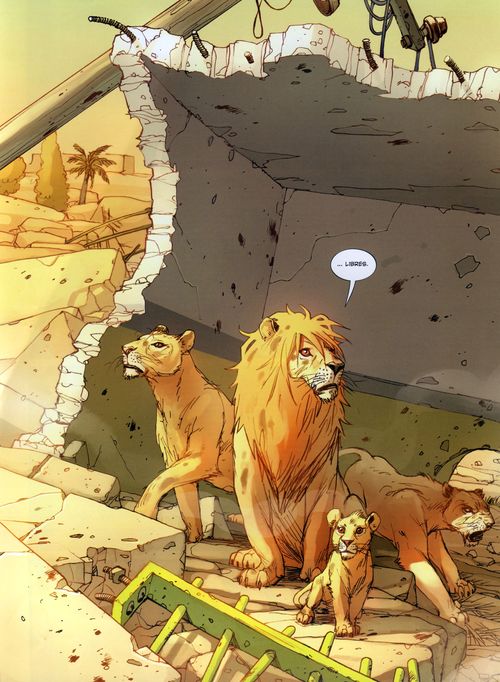Based on true events in which a group of lions escape from a zoo during the opening days of the U.S. "shock and awe" bombing campaign against Iraq, Brian K. Vaughan's Pride of Baghdad dramatizes their short adventure through the ruins of the eponymous city. Driven by hunger and the need to avoid intermittent explosions, the four lions- a protective, savvy male; an eager cub; and two lionesses- one old and world-weary, the other in her prime, pining for freedom from the Zoo- explore, hunt, fight, and take time out to gaze at the sunset until finally they are machine-gunned to pieces by a dopey American soldier.
Niko Henrichon's art is drawn with a confident, sketchy style brought to life with painterly coloring- particularly nice is his use of light and shadow filtered through trees, as well the varying concentrations of algae in the water. Detailed cityscapes, strong use of perspective and careful attention to leonine anthropomorphic facial emoting makes the overall presentation very attractive.
Vaughan's characterization is adequate though at times perfunctory, with relationships just plausible enough to keep the story moving forward and its premise afloat. The writing is at its best when Vaughan takes the time to develop a unique animalian culture. Creating something foreign yet plausible is pretty hard to do with sort-of- sci-fi situations (think aliens with Chinese accents). I like to see how writers resolve this problem. In this case Vaughn creates feline-specific maxims: "Little brains belong in our mouths, not in our heads."

Still, the effect is at times undermined by the occasional colloquialism seemingly coopted from their human oppressors. "You don't look a gift horse in the mouth," says Zill (the male lion), "you eat him." I would guess this particular line was hard to resist, but the story suffers from this inconsistency. It may be a comment on the institutionalization of those imprisoned, but it's somewhat less interesting than being taken through something idiosyncratic and new, a possibility I see existing for the depiction of a familial unit of animals who in nature do little else but kill and sleep.
The basic idea behind the premise, which is to see the devastation of the Iraq war through the eyes of animals (i.e. 'innocents'), is the only really well supported theme in this story, but it feels tired and weather worn, especially considering the fact that it's been used in every animal drama from Bambi to Twilight of the Cockroaches. And there was the inevitable comparison to Disney, vis. the Lion King, initiated by the evident resemblance between the respective lion cub characters and perpetuated by the story's underlying sentimentality w/r/t the lions' love/meat relationship with humans, all of whom they naturally refer to as 'keepers.' While obviously more violent and gritty (giraffe explodes halfway up the neck), it's hard to keep akuna matata from niggling in your head, at least for the first few pages.
It's tough to pin down the story's central themes: Statements like "trust me, nothing that size has enemies" when referring to roving tanks seems weighty and ironic, but isn't supported by and therefor doesn't contribute to any other aspect of the story, and doesn't really even make sense. When the dopey American soldier scrambles to justify the shooting, his superior officer consoles him by saying the lions are now "free."
 Even the epiloguey final word, following a note informing the reader that all this really happened, is unsatisfyingly ambiguous: "There were other casualties as well." Considering the context it's hard not to conclude that Vaughan means to suggest the human cost is somehow less tragic than that of the lions. That humans are vile and deserving of the horrors they visit upon themselves is a fair attitude for a certain kind of writing to have, though considering the half-million and rising civilian death toll in Iraq, it's inappropriate here. And in any case, it contradicts one of the central conflicts, which is whether humans are friends or meat.
Even the epiloguey final word, following a note informing the reader that all this really happened, is unsatisfyingly ambiguous: "There were other casualties as well." Considering the context it's hard not to conclude that Vaughan means to suggest the human cost is somehow less tragic than that of the lions. That humans are vile and deserving of the horrors they visit upon themselves is a fair attitude for a certain kind of writing to have, though considering the half-million and rising civilian death toll in Iraq, it's inappropriate here. And in any case, it contradicts one of the central conflicts, which is whether humans are friends or meat.In general this story feels like a drama that can't decide whether to use the adventure/tragedy as an analogy for man's intrusion into nature and innocents specifically or as a self-aware critique on the vile human condition. By straddling the line between the two, not fully committing to either, Pride of Baghdad comes off as opportunistic and unfocused.
Best line: "I always wanted to kill a baby goat!"
3 comments:
Thanks for putting this review up. I love Pride of Baghdad despite its flaws, and it is great to see someone else's opinion.
butts
Are for pooping, yes.
Post a Comment